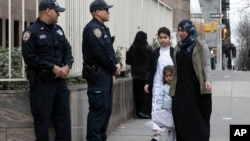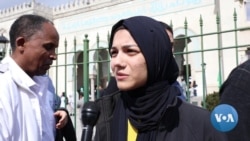U.S. President Donald Trump offered sympathy and his administration's assistance Friday to the people of New Zealand following deadly attacks on two mosques in Christchurch, calling it "a horrible massacre."
While Trump offered condolences, he denied that white nationalism was a rising threat. "I think it's a small group of people that have a very, very serious problem," he said.
The attack during Friday prayers left 49 people dead and dozens of others wounded. New Zealand Prime Minister Jacinda Ardern condemned the act, the country's deadliest mass shooting, as terrorism.
White House national security adviser John Bolton characterized the shooting as "what seems to be a terrorist attack" and a "hate crime." He said the United States was in touch with New Zealand authorities and its embassy in Wellington, and was following the events "very closely."
At a news conference, Nihad Awad, national executive director of the Council on American-Islamic Relations, said that Muslims "have very legitimate fears and they are being told to be afraid by white supremacists and political leaders who believe in white supremacy." But he urged American Muslims to continue their worship during Friday prayers.
Awad said those who incite violence want Muslims to be fearful, but he was confident that authorities were doing all they could to protect mosques.
Vanderbilt University professor Jonathan Metzl, who studies mass shootings and hate crimes, said he believed anti-immigrant and anti-minority political rhetoric have driven white nationalist ideas mainstream.
"What I worry about is not just these online communities, which have been there for a long time. It's also the ways in which this particular violence against vulnerable minority communities and the rhetoric that underlies it has become much more normalized in our political sphere," he said.
Metzl, author of Dying of Whiteness: How the Politics of Racial Resentment is Killing America's Heartland, said, "These shootings are extreme reflections of the increased rise of white nationalist rhetoric."
Politicians react
New York City Mayor Bill de Blasio said he was increasing police presence at mosques around the city, even though "there is no specific or credible threat at this time."
New York Gov. Andrew Cuomo also announced increased police presence at mosques around the state, "as a precaution."
U.S. lawmakers from both parties weighed in, with many 2020 Democratic presidential candidates tweeting their condolences and condemnation of acts of hate and violence.
California Sen. Kamala Harris tweeted that the massacre of "those in a house of worship, in prayer, is evil & cowardly."
"We don't back down in the face of Islamophobia and racism at home or abroad," tweeted former Texas Rep. Beto O'Rourke, saying that "terrorism won't be met with indifference."
Vermont Sen. Bernie Sanders urged people to come together to condemn "all forms of hate and violence" and said that no people should have to fear for their life because of their religion.
House Republicans also tweeted their condemnation, prayers and calls for solidarity.






